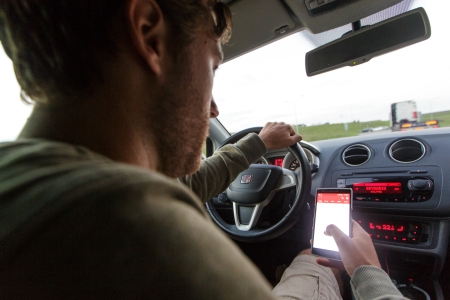Drivers
Many (often somewhat older) driving simulator studies conclude that handsfree calls have no significant advantage over handheld calls. The negative effects on the driving task, such as increased reaction time, are similar for handheld and handsfree calls [30]. During a phone conversation, irrespective of it being a handheld or a handsfree call, drivers are preoccupied with the conversation (cognitive distraction), even though their eyes are on the road. A recent American analysis found that having a phone conversation in the car (handsfree or handheld) did not increase crash risk [16], possibly because drivers compensate for the cognitive distraction, for example by choosing to have a phone conversation in less demanding traffic situations. The same American analysis, however, shows that holding a phone, but also operating a screen to enter a phone number for instance, does increase risk (also see the question How dangerous is it when drivers are distracted in traffic?). This could imply that handsfree calls are to be preferred above handheld calls.
Apart from making calls, some handsfree systems enable drivers to use other phone functions by means of voice control. Research has shown that the use of voice-controlled infotainment systems (among other things for entering a phone number, searching for a specific song, operating the navigation system, or texting) while driving results in a deterioration of driving behaviour: drivers zigzag more, react more slowly and more often miss visual objects [31]. An increase of the cognitive workload and reaction times has also been found [32] [33] [34]. Although these negative effects appear to be smaller than for operating an infotainment touch system, a voice-controlled system will take more time to complete a task [32]. Similar to the effects of a phone conversation, the observed deterioration in driving behaviour may not necessarily lead to an increased crash risk. Again because, in actual traffic, drivers can choose the appropriate moment to operate the infotainment system or can otherwise compensate for the associated cognitive distraction.
Cyclists
Cyclists riding with one hand on account of handheld calls have a harder time maintaining their balance than when they cycle with both hands, in particular when making an emergency stop [35]. During handheld calls cyclists are slower to react to a stop signal than during handsfree calls. No difference, however, has been found between handsfree and handheld calls by cyclists as far as speed, and visual or auditory perception are concerned [36].
Pedestrians
Pedestrian behaviour is also negatively affected by a handsfree call [37]. A reduction of walking speed, longer reaction times and deteriorated visual perception constitute the main findings
